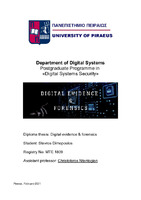Digital evidence & forensics

Master Thesis
Συγγραφέας
Δημόπουλος, Σταύρος
Dimopoulos, Stavros
Ημερομηνία
2021-02Προβολή/
Λέξεις κλειδιά
Cyber ; Cybercrime ; Computer ; Investigation ; Ψηφιακή εγκληματολογία ; Έρευνα ; Κυβερνοέγκλημα ; ΥπολογιστήςΠερίληψη
Η ψηφιακή εγκληματολογία (μερικές φορές γνωστή ως ψηφιακή ιατροδικαστική επιστήμη) είναι ένας κλάδος της εγκληματολογικής επιστήμης που περιλαμβάνει την ανάκτηση και διερεύνηση υλικού που βρίσκεται σε ψηφιακές συσκευές, συχνά σε σχέση με εγκλήματα στον κυβερνοχώρο. Η τεχνική πτυχή μιας έρευνας χωρίζεται σε διάφορους κλάδους, που σχετίζονται με τον τύπο των ψηφιακών συσκευών που εμπλέκονται, δηλαδή είναι η εγκληματολογία υπολογιστών, η εγκληματολογία δικτύων, η εγκληματολογική ανάλυση δεδομένων και η εγκληματολογία κινητών συσκευών. Η εξέταση των ψηφιακών μέσων καλύπτεται από την εθνική και διεθνή νομοθεσία.
Προαπαιτούμενο για την ψηφιακή εγκληματολογία είναι η ηλεκτρονική συλλογή αποδεικτικών στοιχείων που είναι μια διαδικασία που περιλαμβάνει την αξιολόγηση μιας δεδομένης κατάστασης και τον εντοπισμό και την ανάκτηση σχετικών πηγών δεδομένων που θα μπορούσαν να έχουν αποδεικτική αξία για την έρευνα. Κατά τη συλλογή οποιασδήποτε μορφής αποδεικτικών στοιχείων, συμπεριλαμβανομένων των ψηφιακών στοιχείων, είναι ζωτικής σημασίας να ακολουθούνται αυστηρά και να τηρούνται οι κατάλληλες διαδικασίες και οδηγίες.
Για μεγάλο χρονικό διάστημα, οι φορείς επιβολής του του νόμου και οι άλλοι οργανισμοί που εκτελούν ψηφιακές εγκληματολογικές εργασίες που σχετίζονται με έρευνες περιστατικών συχνά βασίζονταν σε μεθοδολογίες που επικεντρώνονταν σε αποδεικτικά στοιχεία που περιέχονται στον σκληρό δίσκο. Αυτό παραβλέπει τον πλούτο των πληροφοριών που περιέχονται στη μνήμη τυχαίας προσπέλασης (RAM) του στοχευμένου συστήματος. Στην την τελευταία ενότητα αυτής της διατριβής θα παρουσιάσουμε ένα εργαστηριακό πείραμα απόκτησης και διερεύνησης μνήμης (RAM).


